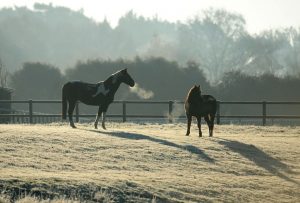
During the winter season, temperatures typically fall below that necessary for pasture grass to grow. Pastures become rapidly depleted of natural forage and horses must increasingly rely on their owners to provide them with a nutritionally adequate diet. To properly feed a horse during the winter months several key factors must be addressed. These factors are water, fibre and essential nutrients.
Water should always be the first consideration in the diet for any horse. An adult horse (500 kg) in a cool, comfortable environment that is not working or lactating requires a minimum of 25 – 35 litres of fresh clean water per day. Impaction colic in horses during the winter months is one of our greatest concerns. This form of colic is mainly due to the horse becoming dehydrated because it consumes less water due to cooler temperatures (no sweating), less water availability (frozen ponds, cold water, etc.), and a diet of hay (10% water content) instead of pasture (80% water content). When horses drink cold water during the winter, their bodies must expend additional calories to warm their tissues back up from the heat loss that is incurred, so they instinctively drink less. Warming water or using insulated or heated buckets that keep water temperature above freezing will allow the horse to consume more water. Research has shown that horses drink the most water when the water temperature is between 7 and 20º C. Optimum water consumption will keep the fibre in the horse’s digestive system hydrated, allowing it to be broken down efficiently by intestinal bacteria and to be pliable, and less likely to “ball up” and cause a blockage in the large intestine. The water requirement is higher if the horse is in training, nursing a foal, growing, or pregnant.
Adequate fibre intake is the next consideration in feeding horses during the winter season. It is recommended that horses receive a minimum of 1.5% of their body weight in hay (fibre) per day. For a 500kg horse, this equates to 7.5 kg of hay per day. Horses can consume up to 3% of the body weight per day in hay (15 kg for a 500kg horse) if the hay is of good quality. The fibre obtained from hay is necessary to keep the digestive system of the horse functioning properly. Without this hay fibre, horses will seek out other sources of fibre including bedding and wood fences or trees to satisfy their needs. Adequate fibre from hay is even more critical during the winter months since it is the feed ingredient that keeps horses warm during cold weather. Digestion and fermentation of hay produces heat that helps the horse maintain its body temperature during winter. Unlike hay, consumption of grain does not produce large amounts of body heat during digestion. One problem that may arise with horses during the winter months is chronic weight loss. This can occur either by not feeding enough hay or by feeding poor quality hay to the horse. In both cases the horse will have trouble getting enough calories to maintain body weight. In the case of not feeding enough hay, the simple remedy is to provide all the hay the horse will consume during the day. If the horse is being fed all the hay it will consume and weight loss is still an issue, better quality hay must be fed. Better quality hays typically contain higher calories for example Lucerne compared to grass hay. Other baled hay substitutes, such as hay cubes, hay pellets or “hay extenders” can be fed to replace poor quality hay. Robank Weight Gain is a great way to increase body condition in your horse safely.
Finally, the protein, trace mineral and vitamin needs of the horse must be satisfied. Winter is a critical time to supply these nutrients since pasture, a good natural source of nutrients, is no longer available. The common source of supplemental protein, vitamins and minerals is from fortified grain concentrates. It is crucial that you choose the product that is intended for the type of horse that you are feeding. For example, if you have a pregnant mare you would select a product intended for pregnant mares, not “senior” horses. The next critical factor in choosing a grain concentrate is to make sure you are feeding the recommended amount. If you are feeding 1/3 of the amount recommended, you are getting exactly 1/3 of the intended nutrients for that type of horse. If you feel the amount of feed recommended is too much i.e. your horse is gaining too much weight you should feed a more concentrated product. These more concentrated products are called “supplement or balancer pellets” and are designed to be fed at much lower rates but are still fortified to provide the horse with adequate nutrients. Robank Signature Balancer is an ideal product in this category.
Winter is also the time when the barn may be “closed up” in an effort to make the environment warmer and less drafty for the horse. Good ventilation is more important than providing a little more warmth, so be sure to provide good air flow in your barn even in winter time.
